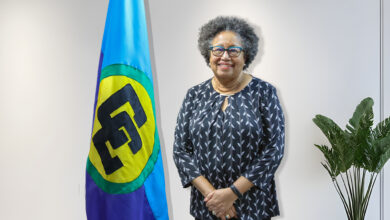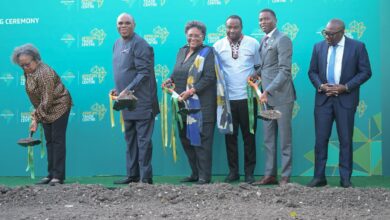- Your Excellency Malgorzata Wasilewska, Head of Delegation of the European Union to Barbados, the Eastern Caribbean States, the OECS and CARICOM/CARIFORUM;
- Your Excellency George Talbot, Plenipotentiary Representative of the Cooperative Republic of Guyana to the Caribbean Community (CARICOM), Ministry of Foreign Affairs and International Cooperation, Guyana;
- Ms. Volika Jaikishun, Deputy Chief Education Officer, Development, Ministry of Education, Guyana;
- Ms. Renee Atwell, Dean, CARICOM Youth Ambassador Programme;
- Special Invited Guests;
- Teachers Participating in Programme;
- Ladies and Gentlemen.
Welcome to the Headquarters of the Caribbean Community (CARICOM) Secretariat. Good morning to all of you who have taken the time to join us in this hybrid Launch of the CARICOM Skilled Workers Programme. The execution of these interventions was delayed because of the COVID-19 pandemic. However, we are pleased to start coinciding with the component for CARICOM Secondary School teachers here in Guyana and in other Member States.
The CARICOM Skilled Workers Programme is a Community activity that provides opportunities for learning best practices to administer the regimes of the CARICOM Single Market and Economy (CSME). The intention is to also develop practical skills through work-related attachments, which will assist Member States to implement the CSME, and decisions of the Organs and Bodies of the Community.
Another part of the plan is to have effective advocates for CARICOM integration, through the exposure given to participants. Thus, the targeted groups have been selected for the critical role they can play in implementing, in sustaining training at the national level and in advocacy in respect of the CSME, in particular, the free movement of CARICOM skilled nationals.
Our research and observations over the years indicate the need for improved understanding of procedures, as well as adherence to guidelines for operation of the CSME. Low levels of knowledge of the issuance of the relevant certificates to facilitate access to the various regimes are also noted. The absence of such basic knowledge can adversely impact our nationals’ ability or willingness to capitalize on the Free Movement Regimes.
Against this background, an assessment of the impact of our CSME public education recommended ongoing training for immigration personnel, as they are the primary facilitators and gatekeepers of free movement. Interactive programmes for the youth, and entrenchment of the CSME in the school curriculum are among other recommended measures.
Therefore, in continuing to engage Member States, the CARICOM Secretariat developed the programme being launched today, which involves:
- one-week work attachments of border officials in different Member States, to allow for sharing of best practices in the administration of the Free Movement Regime for Skilled Nationals;
- placement of CSME Focal Points in the private and public sectors, and Regional Institutions for one week. Focal Points will benefit from observing and sharing best practices in operations of the CSME in key areas;
- two-week work attachments for secondary school teachers to be exposed to teaching CSME and wider CARICOM integration in the classrooms in other Member States, and how best practices can be replicated in their own schools. The attachments will also serve to better inform participants about the qualification framework for the free movement of skills, such as the levels of technical qualifications, skilled national certification, and categories of skills approved for free movement; and
- one-week internships for the new cohort of CARICOM Youth Ambassadors (CYAs) at the CARICOM Secretariat to expose them to regional integration processes, so they can become better advocates for regional integration.
While the focus is on teachers for the next two weeks, we expect to roll out the other attachments at the earliest opportunity, even with the realities of air transportation in our Region. I understand, only too well, the challenges you teachers from St. Kitts and Nevis, Montserrat, and Antigua and Barbuda experienced to arrive in Guyana for your attachments. The story is the same for the other participants simultaneously placed at schools in St. Kitts and Nevis, Trinidad and Tobago, Belize and Barbados.
It can be considered fortuitous that the Secondary School Teacher Attachment is the first segment of the Programme activated. The capacity building for the teachers will benefit youths in their classrooms. Involvement of youth in regional integration must be seen in tangible terms and, over the years, the Secretariat has managed with limited resources to meaningfully engage this key stakeholder group.
It seems like yesterday I was interacting with Grenadian students visiting Belize, under another CARICOM Secretariat activity exposing CARICOM tertiary students to the CSME via field missions. But, that was in September 2015, some eight years ago. Today, as CARICOM Secretary-General, I am pleased to see the continuation of efforts to share information with our youth so that they can better support CARICOM integration processes.
That tertiary student assignment also had the support of the European Union, and I place on record our appreciation for the continued assistance.
A key aspect of making the Region competitive is the efficient and effective operation of the Free Movement of Persons Regime. The Community’s approach to its free movement goals has been to increase the number of skilled categories eligible for free movement in stages, with 12 categories now covered.
The Secretariat undertook an exercise which compared the approved categories of skilled CARICOM nationals with the occupations captured by the International Standard Classification of Occupations (ISCO) of the International Labour Organization (ILO), with a view to determining which of those occupations are not covered by the approved categories of skilled CARICOM nationals.
One key preliminary finding is that the major occupational groups of managers, professionals and technicians, and associate professionals are largely covered by various approved categories of skilled Community nationals, namely, university graduates, holders of associate degrees or comparable qualifications, media workers, musicians, artistes, sportspersons, nurses and teachers. There remain various elementary occupations not covered by the approved categories of skilled Community nationals.
Another analytic study done by the Secretariat indicates that with the existing approved skilled categories, between 26% and 36% of the workforce have access to the skilled national regime. If the qualification requirements relied more on attestations of skills rather than on qualifications (Degree, Diploma or CVQ holders), then a further 10% of the workforce would be able to access the free movement regime.
These studies, among others, provide input for the discussions and approaches being considered as we address advancing regional integration. This is certainly timely as we celebrate our 50th anniversary and consider the strategies for another 50 years of CARICOM integration.
I join all who have heralded the efforts in coordinating these activities, especially at this time. Best wishes to the teachers who are in the field for the next two weeks. I look forward to seeing the successful execution of the entire CARICOM Skills Workers Programme.






